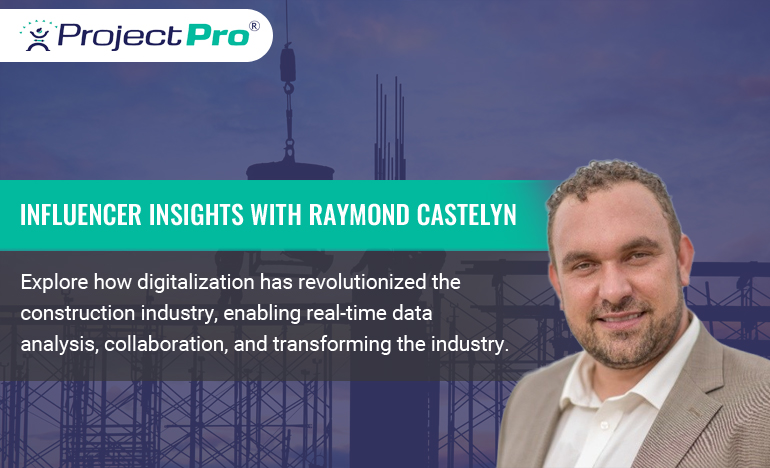Discussed the Digital Shift in the Construction Industry with Raymond Castelyn
Over the past few decades, the construction industry has seen a rapid rise in the adoption of technology.
Technology has revolutionized how buildings are designed, constructed, and maintained, from digital design software to advanced robotics. One major factor driving this shift is the need for greater efficiency and accuracy in the construction process.
For example, building information modeling (BIM) software allows architects, engineers, and contractors to collaborate more seamlessly, reducing errors and streamlining communication.
So to shed some light on the same, we interviewed the industry expert, Raymond Castelyn, to help our audience understand the impact of technology in the construction industry.
Who Did We Interview?
Raymond Castelyn is a Chartered Civil Engineer with a passion for construction project management and digital transformation.
Starting as an entry-level civil engineer, Raymond has climbed the ladder to manage renewable energy mega projects and has been instrumental in driving digital transformation by implementing innovative digital tools for HSQE, 4D planning, and Control Rooms on various projects, frameworks, and Alliances.
As a founder and CEO, Raymond is dedicated to creating safer working environments and a sustainable future for his clients.
Let Us Quickly Get To Our Expert’s Point Of View.
Question 1: How do you see the construction industry in the year 2023? Do you think this year will be a "digital year" for construction professionals?
Yes, I believe 2023 will be yet another important stepping stone for the construction industry in areas like BIM, Digital Twins, Robotics, drones, VR, cloud computing, and mobile technology.
I expect the maturity of solutions will be accelerated significantly with the introduction of AI, and it will become a fundamental pillar of data harvesting, processing, and visualization in the coming years. This maturity will gather greater interest as early adopters will increase efficiencies and profitability, directly addressing the industry labor/staff shortages and giving them an edge over their competitors.
This should set the stage for faster adoption by non-digitized businesses as they will be left behind and unable to compete with the digitized companies (early adopters) that can do more for less and at a quicker pace.
Question 2: The construction industry has undergone dynamic changes over the years. What do you consider the biggest challenge for this industry now?
Resistance to change has always been the biggest challenge, especially considering how quickly people moved from analog to smartphones/tablets when they came out in 2007/10, respectively, in their personal lives. This applies to applications and other areas, as well as robotics, 3D printing, and modular construction.
The key difference in personal vs. business applications is that personal apps (Big tech Amazon, Facebook, etc.) are designed to make the user experience seamless. Still, most business applications focus on the outcome (irrespective of how complex it is to achieve it) where extensive training is required – no one has ever attended a training session to use Amazon/Facebook (but we all know how to use it).
I believe AI will become a key component in designing and testing Applications and solutions to improve the user experience – and by default, drive better adoption. Another challenge we regularly hear is users complaining that there are too many apps, they have different apps for every solution – open APIs and cross-platform integrations will become extremely important to ensure seamless user adoption and data flows. By using better solutions, we can automate around 74% (from the study mentioned below) of all manual tasks allowing staff to focus on what really matters.
Question 3: What potential do you see in the latest construction technology trends? Are they capable of boosting the productivity of construction professionals?
Cloud computing and open APIs are the best way to centralize and aggregate data, irrespective of the tech area to consider. Digital data entry and structured data allow seamless data transfers between applications, enabling centralized data aggregation of systems and dashboarding – all leading to better communication, immediate insights, and the ability to act faster. There are many well-published examples (like Digital Twins, 4D Planning, diaries, photos, forms, issues, and asset management) where digitized or automated data capture can improve the accuracy of the information, improve efficiencies and reduce costs.
From various publicized studies and a case study on over 100 projects we undertook in 2022, we found that 74% of all new site user onboarding/training/timekeeping tasks are non-value-adding. Digitizing this alone provided an ROI of 1:9.7, nearly saving every supervisor 2 hours daily. From other research I've done at the Transpennine Route Upgrade Project, I found that by only adopting currently available solutions across all disciplines in a business, we could easily save everyone in the business 1 hour a day (15% efficiency gain). This would either lead to needing fewer people to undertake the same work or undertaking more work with the same staff.
Question 4: Where do you see the construction industry in the next five years? Please share your valuable insights with our readers.
AI will be the next big thing engulfing almost everything we do, from mundane tasks like to-do lists, emails, and minutes of meetings to the more complex generative designs with built-in carbon calculators with seamless data integrations and dashboarding.
There will also be significant strides in BIM, digital twins, drones, and AR/VR with direct integrations with various data-capturing / analytic solutions to streamline information sharing and provide nearly real-time updates on project progress, risks, and budgets. Data analytics will be automated, allowing for real-time trending and alerts. I believe that only businesses that invest in digitization in the coming years will be able to compete in the future market.
Get to Know Our Influencer
Question 5: In four words or less, what's your prediction about the transforming construction industry?
Data-driven decision making.
Question 6: What's your success mantra?
The hardest part of a change is to start.
Therefore there is no better time to start than now.
More Details
With over 20 years of experience across multiple industries, including rail, marine, highways, renewable energy, and construction tech, Raymond has developed a wealth of expertise in managing complex projects and leading cutting-edge digital initiatives.
His passion for innovation and business improvement is contagious, and he constantly seeks new ways to help his clients achieve their goals.





